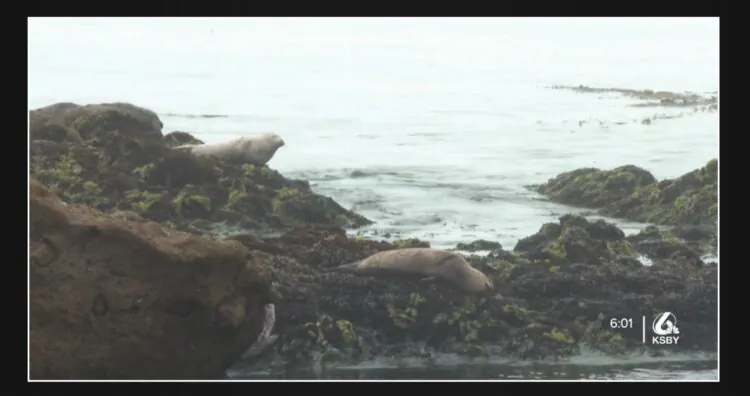When you visit certain Central Coast beaches, you might catch a glimpse of sea lions frolicking amidst rocks or lounging lazily on the sand.
It has been approximately three weeks since marine mammals along the coast have been experiencing harm from domoic acid.
According to one rescue organization, the current number of rescues is already four times higher than what they witnessed in the entirety of the previous year.
Last week, Chris La Scola claimed to have spotted a sick sea lion near the Cal Poly Pier in Avila Beach.
“I have been fishing on these rocks for as long as I can remember, and this is something I have never witnessed before,” expressed La Scola with astonishment.
As he looked on, he noticed the sea lion trapped between the rocks.
La Scola described the creature as “definitely alive” but noticed that it was shaking slightly, almost as if it were convulsing.
Over the past two weeks, Frady, an avid surfer in Shell Beach, has encountered more than five sea lions that appeared to be unwell.
According to Frady, it is not uncommon to see the seals in that area for extended periods, only to find them dead the next day.
Marine mammals can suffer from poisoning due to domoic acid when they consume fish that has been contaminated. This toxin can lead to seizures, brain damage, and even death, as stated by NOAA Fisheries.
Frady expressed his desire to assist those in need, acknowledging that no one would be able to provide care for them if he were to attempt a rescue.
Officials from the Marine Center caution that it is important to maintain a safe distance of at least 50 yards from sea lions due to the unpredictable nature of these mammals and the potential stress it can cause them.
NOAA states that domoic acid does not pose a threat to fish or swimmers. However, it can be present in shellfish, mussels, oysters, and Dungeness crab.
The Marine Mammal Center is currently uncertain about the duration of this situation, as they are not observing any significant decrease at the moment. If you encounter a mammal that requires help, please contact 415-289-SEAL.


